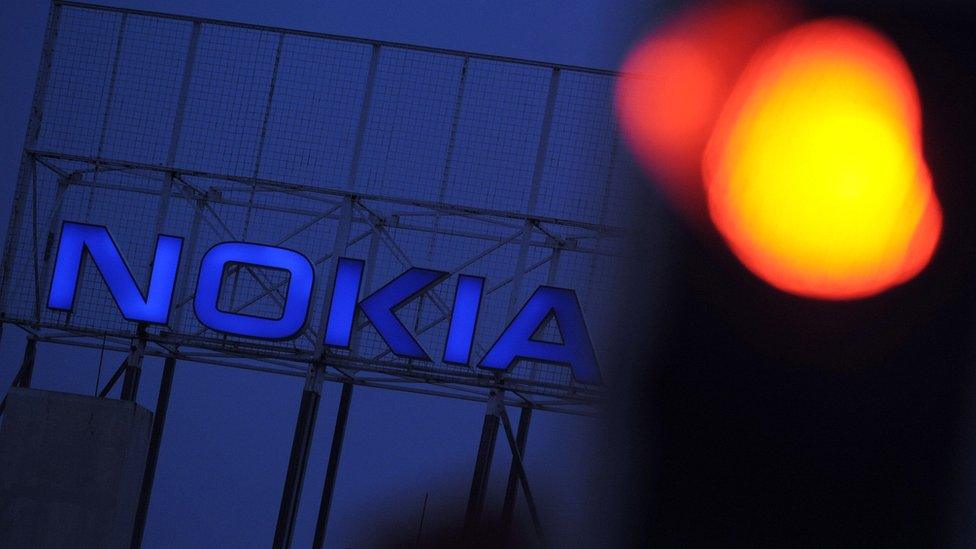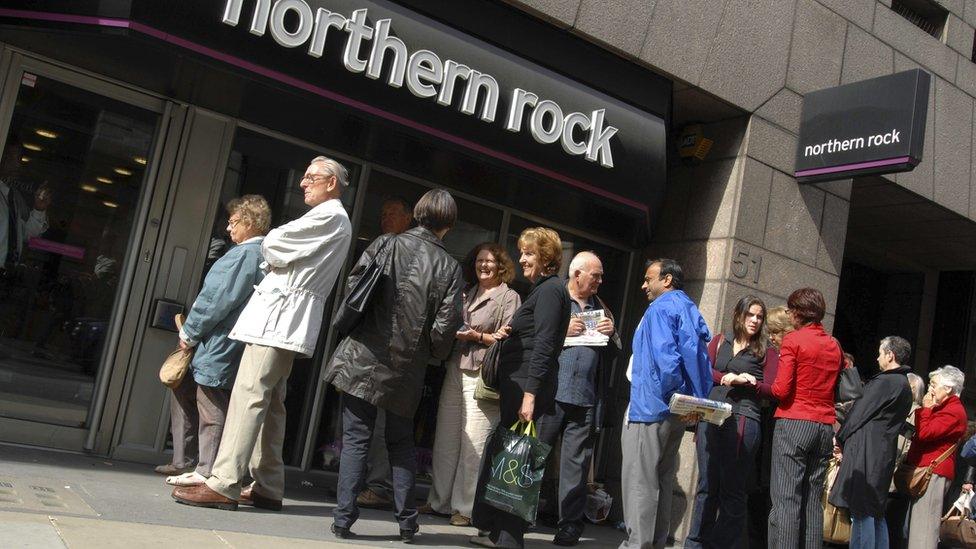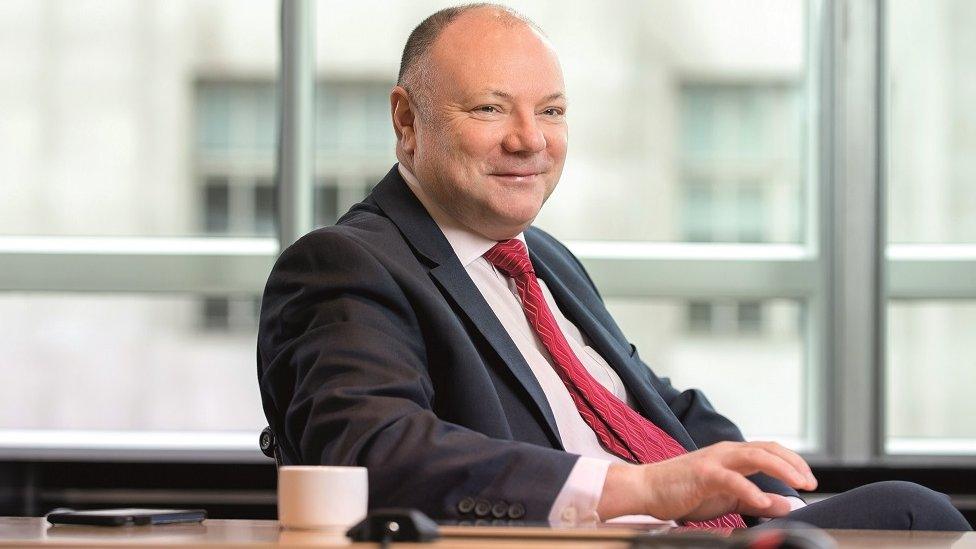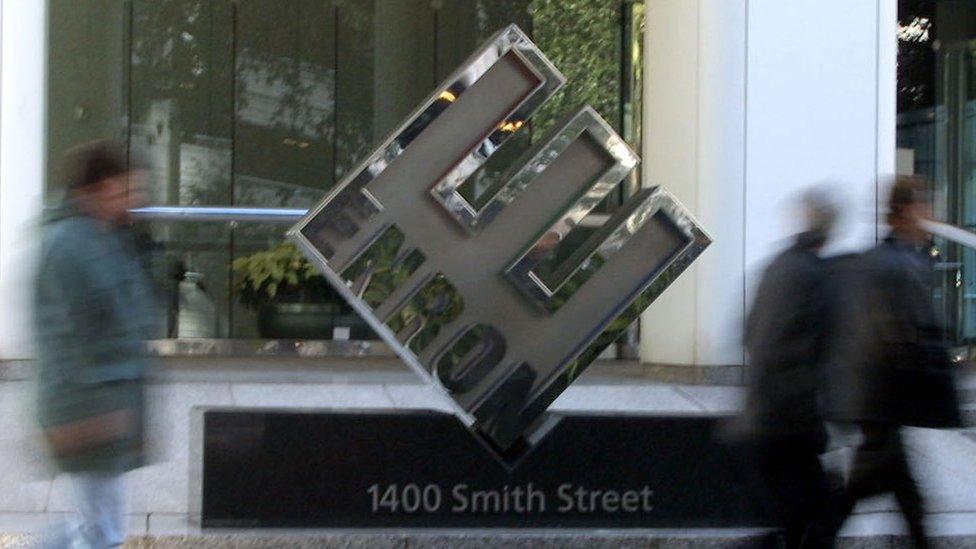The 'deadly sins' of business
- Published

Carillion buckled under the weight of a whopping £1.5bn debt pile
Despite ranks of highly paid executives and advisors, big companies can take decisions that seem at best baffling and at worst self-destructive.
So how do such big organisations, led by well-paid chief executives and with the money to hire the best staff and advisers, get into such trouble?
Take Carillion, for example. It failed earlier this year and thousands of jobs were lost.
Here a huge construction company signed contracts with profit margins so fine, that delays resulted in huge losses.
Or cast your mind back to Nokia, which once dominated the market for mobile phones, until it failed to recognise the challenge from the iPhone.

Finland's Nokia lost its market dominance with remarkable swiftness
There are some classic traps that big firms are vulnerable to. Let's call them the "deadly sins" of the corporate world.
Hubris
In August 2008 Gary Hoffman walked into the offices of Northern Rock in Newcastle.
He had been appointed chief executive of the mortgage lender which had been taken over by the government earlier in the year after almost collapsing.

People queuing outside a branch of Northern Rock at the height of the banking crisis in 2008
One of his first impressions was the "palatial" offices and the even more luxurious headquarters that were under construction.
"The leadership had lost connection with the real world," Mr Hoffman says.
"They were in large offices, separate from their colleagues. It was physically difficult for their colleagues to speak to them."
Northern Rock had undergone a rapid expansion by offering attractive mortgage deals and financing those deals by short-term borrowing.
"They had got carried away with their own personal and corporate ambitions," he says.

Gary Hoffman was brought into run Northern Rock after its government bailout
In Mr Hoffman's opinion: "The higher you get up your organisation, it is even more important that you ground yourself."
"And if you're not careful, people will not tell you when things are going wrong."
At his current company, the insurer Hastings, Mr Hoffman says management spend a lot of time talking to staff and trying to get things put right for them.
"It might just be the food in the canteen," he says.
Fear
Bill Grimsey is a veteran retailer, who has seen what a big company in trouble looks like.
In 1996 he was appointed chief executive of the DIY chain Wickes which was in danger of collapsing due to an accounting fraud. He raised fresh finance at the company and changed its culture.

A £20m fraud brought the Wickes DIY chain to its knees in the 1990s
One technique that he found helpful was to spend a week each year working at a different branch and finding out what problems the staff were having.
"You mustn't underestimate the influence of the leader on the business," he says.
He has come across chief executives who govern by fear, leaving their managers worried about losing their jobs and just "doing as they're told".
Mr Grimsey describes one chief executive who ran his company as "dictatorship" where the customer was "barely mentioned".

As a manager you need to make sure you don't shout down your employees, says Gary Hoffman
Under those circumstances Mr Grimsey said staff can resort to desperate measures, like faking the numbers to keep their boss happy.
Gary Hoffman makes a similar point. Bosses have to be so careful when dealing with their staff, especially when they approach them with problems, he says.
"When you wield power as chief executive and you shout them down, then they don't come back very often."
Complacency
"Anyone can grow fast," says Mr Hoffman.
"You have to make sure than when you are growing very fast your are not taking on too much risk," he says.

Air Berlin failed in 2017 after making hefty losses
He points to the low-cost airline business, where customers love the cheap prices, but maybe some airlines are just not charging enough to survive.
Last year saw both Monarch Airlines and Air Berlin both fail after racking up big losses.
Chief executives need to ensure that everything they do is "anchored in the principles of profitability", which sounds obvious.
But Mr Hoffman says bosses can be blinded by growth for growth's sake.
In the retail sector, it's not uncommon for retailers to forget something else obvious - the customer.

Growth is all very well - just don't forget your customers
Mr Grimsey says: "It's when they become complacent, they keep delivering the same things day-in and day-out and fail to recognise that consumers change in terms of their style and interests and their behaviour patterns."
Greed
According to Mr Grimsey boards of directors spend too much time worrying about the pay and bonuses of the top executives.
"If you look at the history of the last 15 years in corporate Britain, particularly retailing, particularly public companies, these people have become greedy.
"You've got to stop being greedy at the top and start sharing. You've got to spread the rewards through out the organisation."

The John Lewis Partnership is owned by its 84,000 staff known as "partners"
He points to John Lewis as a better model for paying staff. Each year shop floor workers get a share of the profits (even if, in March this year, John Lewis Partnership announced bonuses had been cut for the fifth year in a row).
Professor André Spicer, professor of organisational behaviour at Cass School of Business, says the way top executives are paid can be part of the problem.
"Significant" parts of pay packets are made up of share awards, which can be cashed-in too quickly he said.
"Short term results often trump long-term survival", he says.
Superficiality
In some companies "there is a lot of focus placed on creating a facade that makes things looks good," says Prof Spicer.
This can include spending excessive amounts of money on branding initiatives, or introducing management fads and fashions.
Both of those could involve spending too much on consultants, which in some cases "outsources responsibility", he says.

When Enron collapsed in 2001 it was the biggest US corporate failure
Enron is a good example of a company that built a brilliant facade that hid deep problems, says Prof Spicer.
The energy firm had been lauded in the press for disrupting the energy industry, but had been hiding billions of dollars of debts and collapsed in 2001 - at the time the biggest failure in US corporate history.
Prof Spicer warns it is "far easier" to change a company's image than make real changes.